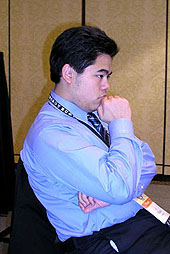|
What are some other issues on the "death" of chess? Well… Bobby Fischer has finally been released after being taken in illegal custody in Japan. Fischer emerged from his eight-month confinement looking horribly unkempt, disheveled, disoriented and with a knot on the right side of his forehead. How is it that a international chess icon can be treated this way by an influential nation on dubious charges? Perhaps Fischer has some unpopular political views, but what was Japan's motive? It is clear that respect for professional chess is at rock bottom. Nakamura's statement has an irony because it was Fischer who uttered the same words years ago (also in a controversial interview in 2002).
What are the repercussions of these events? One such repercussion is that young wunderkinds often mentioned as saviours of chess will certainly think twice about making chess a career. Nakamura has already been quoted as saying that he has examined (or is examining) other options (for personal reasons). What kind of chess world will these young stars have to look forward to? The type of impression they may get is that chess champions are not respected, thus interests not protected (e.g., Ruslan Ponomariov); they are vulnerable to harassment and attacks (see Fischer and Zurab Azmaiparashvili cases); they cannot solve the unification quandary; they harbor personal quarrels at the expense of chess advancement. Most of all… they quit.
Would players such as Nakamura, Teimour Radjabov, Sergey Karjakin and Magnus Carlsen be better off taking up a career in medicine, law, accounting or computer science? Certainly, the parents of these talented teenagers are also thinking of these questions. It would be safe to say that while the unification process may limp forward, it may be harder than ever to find a sponsor for a major unification effort. Kasparov has almost single-handedly put a final nail in the unification process and will make a foray into Russian politics. Like Michael Jordan's ill-fated attempt at professional baseball after his first retirement, Kasparov political ambitions will only make flaws more evident. Many Russian politicians are skeptical. Besides… if his sport collapses, will anyone remember (or care) that he was once World Champion?
Dr. Daaim Shabazz, The Chess Drum
|
|
